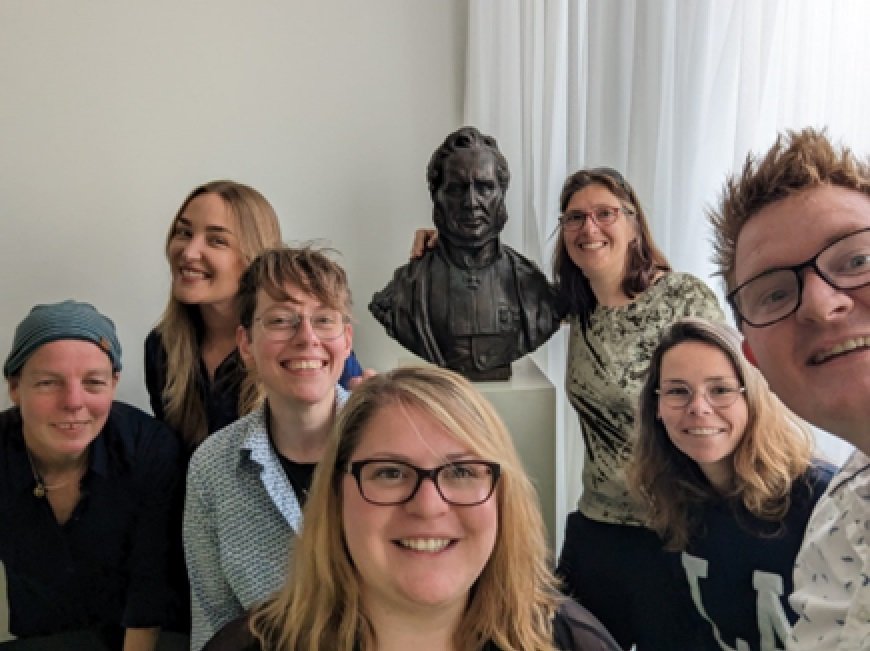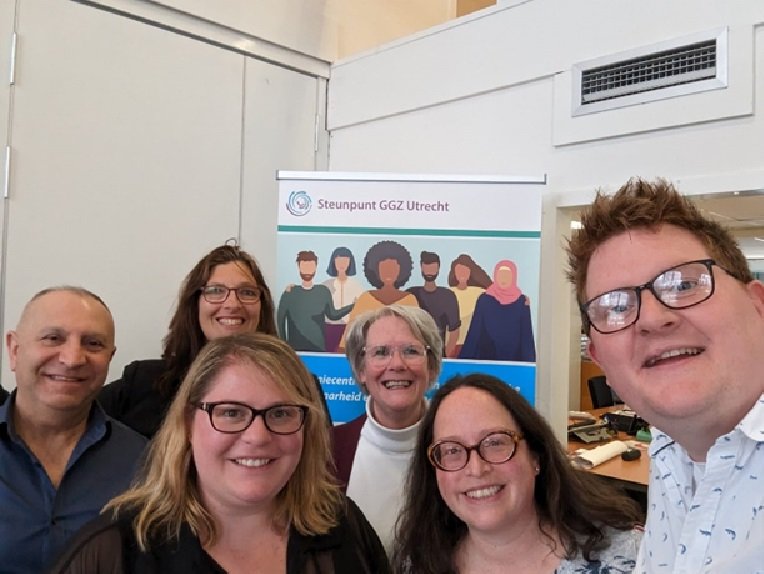The unlikely similarity between mental health services design and Tulip cultivation
5-minute read
A different sightseeing tour
A couple of months ago, most people visiting the Netherlands would be on a tour of the Tulip fields. Instead, my Habitus colleague and I found ourselves in Utrecht for what I felt was an equally appealing and fascinating ‘Mental Health Tour of the City.’ This was enabled through my membership of the International Initiative for Mental Health Leadership (@IIMHL), where I was guided by friend and resident connector, Beverley.
With some borrowed bicycles, in just one day I visited four, yes FOUR, different mental health and peer support services. The physical accessibility of the city and its services was second-to-none. I’ve not experienced anything like it before. For me, it pressed home just how interlinked the success of mental health services are with the rest of a city’s services and infrastructure.
There were three points from the tour that stood out and reminded me that there really is a mental health world outside of your own. The big changes we long for do exist as practical examples elsewhere.
Reminder #1: Advocating for particular goals is possible
It was the visit to the first two sites where I admit I might have become a little emotional. Beverley showed us a beautiful photo exhibition about a nearby community for people who use drugs. The charity that facilitated and supported this community used harm reduction practices that would be completely out of the question in the many different countries in which I've worked. It meant that these people's lives were valued – they continue to not just survive, but thrive. After working with people who use drugs for many years, to see a community created just for them, was overwhelming.
I then visited the regional Recovery College. Habitus Collective has supported the initial setup, operational aspects and evaluations of Recovery Colleges across the UK and Canada. We know a lot about how to run them and what drives their impact. This was the first time I had been to a Recovery College with its very own farm animals. When the manager (a Peer Supporter themself) showed me the respite rooms, I again became a little emotional.
Something I've long advocated for in my career was there to see, living and breathing in real-life. A service in which people with mental health challenges can check-in for the week and use the services of the whole Recovery Centre if they wish, with very little to no wait list. All of which supported and run by Peer Supporters. Amazing!
Reminder #2: Practice is cultural, not absolute
I finished the day in an Early Intervention Youth Centre. You would never guess it was a mental health centre as it looked like a typical Dutch-style terraced house. There were two points where I caught how ‘British’ I was in my perspectives on mental health.
First, I asked a question about Step-down Services from in-patient hospital care – where were they?
“In our health system we are trying to close psychiatric beds, so services are more about prevention” was the reply from my wonderful host.
Preventative mental health care such as this is something I hoped to see for my whole career and it's wonderful to see it happening right now in the Netherlands.
I felt quite embarrassed having asked the question. Because despite what I had seen all day, I was still framing my thoughts and expectations on what mental health services look like in the UK and North America. It can be all too easy in the experience of day-to-day provision of mental health services to focus on what currently exists, rather than what is possible. My host’s answer was a brilliant nudge to remind me that while the changes we want to happen may be a long time coming, we should not limit our overall aspirations.
Second, when I visited the centre’s garden, I saw a very large spiky holly bush and a rope swing hanging from a large tree. The instant reaction I had was that these two objects would be very unlikely to be seen in a youth mental health centre in the UK due to health and safety reasons. Yet here, dignity of risk comes first, alongside the beauty and enjoyment of the outdoor space. That memory still holds with me.
“In our health system we are trying to close psychiatric beds, so services are more about prevention”
Reminder #3: Different places, similar problems, various solutions
The wonderful thing about mental health and peer support is that you can find understanding regardless of where you are. The Peer Supporters I met were doing remarkable things, though also challenged by systems just like in Canada, England, or Scotland.
There are many strengths to the system that has been created in the Netherlands for us all to learn from. Equally, there are things that we can share from Habitus and our partners from all over the World. Whether that’s how Peer Supporters have built leadership positions for themselves in the UK or integrated multicultural approaches into their practice in Canada.
Communicating across borders is never just a one-way street of learning. Two things I believe we can share:
(1) our knowledge and experience of peer leadership through the International Peer Leadership Network (I-PLN); and,
(2) our learning as we explore multi-culturalism and anti-racism as a part of mental health systems and services.
Every country has hidden policy that can be primary blockers to advancement. The skilled and talented Peer leaders I met shared their challenges with insurance systems and bureaucracy that prevented promotion and advancement in the peer support role. A challenge being overcome by Peer Supporters in England.
Meeting with Steunpunt GGZ, Utrecht who are trying to ensure inclusivity of those traditionally left out of the mental health system because of ethnicity or race. Their approaches to peer support and lived experience are shared by many organisations in the UK. Staff work with communities where they are at, like mosques and community centres. They are also facing the same challenges as organisations in the UK, such as being siloed as ‘the’ organisation that works with multicultural communities. Breaking out of that role is working, however.
To keep to the flower theme, just like cultivating a new variety of Tulip (a lengthy process of performing daily tasks and encouraging change each season), change occurs if we keep nurturing and promoting it. The end result can be something that is different and beautiful.
To keep to the flower theme, just like cultivating a new variety of Tulip (a lengthy process of performing daily tasks and encouraging change each season), change occurs if we keep nurturing and promoting it. The end result can be something that is different and beautiful.
What next?
Habitus Collective has grown its international perspective. We have new relationships and connections that we can share with our partners to advance their programmes, evaluations and collaborations.
I’ll be back in the Netherlands in June 2024, where Beverley and her colleagues will be hosting the next IIMHL conference.
In the meantime, the I-PLN hosted by Habitus Collective is using this international relational strength to continue to advance peer support leadership. If you’re a practising Peer Supporter interested in leadership, or if you are an ally, let us know by following us on LinkedIn or Twitter. Over the next year we will continue to advance our practice skills.
At Habitus, we have helped develop and design successful peer support and community programmes for various charities, health organisations and businesses both in the UK and internationally. Find out how we can help your organisation do likewise and for other types of support we offer by clicking the button below.
We are accomplished in peer research, co-production, action-based and anti-oppressive research and evaluation. We are experts in helping organisations to engage wider community participation in their projects so that their work is more inclusive and impactful. Through this approach we are dedicated to increasing lived experience leadership.



